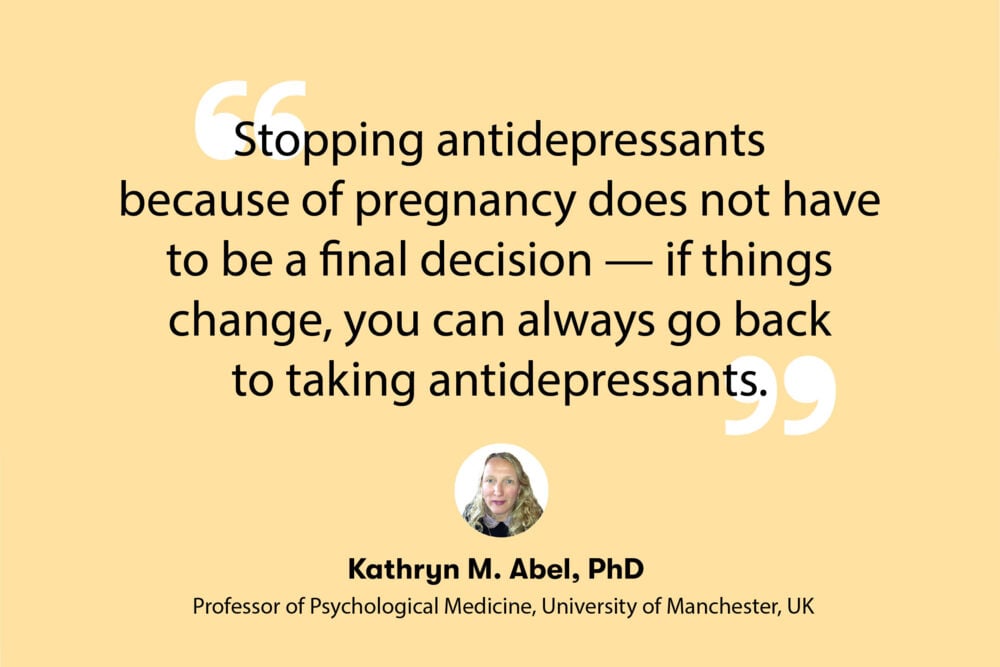Kathryn Abel, Professor of Psychological Medicine, answers four of the most common questions on mental health disorders and how they can affect pregnancy.
-
Tracking cycle
-
Getting pregnant
-
Pregnancy
-
Help Center
-
Flo for Partners
-
Anonymous Mode
-
Flo app reviews
-
Flo Premium New
-
Secret Chats New
-
Symptom Checker New
-
Your cycle
-
Health 360°
-
Getting pregnant
-
Pregnancy
-
Being a mom
-
LGBTQ+
-
Quizzes
-
Ovulation calculator
-
hCG calculator
-
Pregnancy test calculator
-
Menstrual cycle calculator
-
Period calculator
-
Implantation calculator
-
Pregnancy weeks to months calculator
-
Pregnancy due date calculator
-
IVF and FET due date calculator
-
Due date calculator by ultrasound
-
Medical Affairs
-
Science & Research
-
Pass It On Project New
-
Privacy Portal
-
Press Center
-
Flo Accuracy
-
Careers
-
Contact Us
Depression During Pregnancy: 4 Questions Answered by the Expert


Every piece of content at Flo Health adheres to the highest editorial standards for language, style, and medical accuracy. To learn what we do to deliver the best health and lifestyle insights to you, check out our content review principles.
Interview has been edited for clarity.
#1 Are some gynecological conditions related to mental health disorders?
According to Dr. Abel, there are a number of things that occur more often in people with mental illness, like polycystic ovary syndrome and female infertility.
She says that people with mental illness, such as depression or schizophrenia, are more likely to have issues with pregnancies, like premature labor and smaller babies.
“And there are more likely to be other complications: the baby may be a little flatter at birth with a low Apgar score, which is a test of how well the baby is breathing, if they are floppy, and so on. They tend to have slightly lower Apgar scores, but they recover quickly.”
Dr. Abel also points out that, unfortunately, it does remain the case that people with more severe mental illness during pregnancy are more likely to lose a baby.
“It may be that those with the most severe depression are also those at greatest risk of miscarriage — suggesting that teenagers, people who take drugs and alcohol, and people with infection are at greatest risk of losing a baby. People with mental illnesses are also more likely to have an infection during pregnancy.”
# 2 If a person with a history of depression plans a pregnancy, what steps should be taken?
Dr. Abel says that it’s vital to let your prenatal care team, midwives, and doctors know if you have a history of depression so you can get better prenatal monitoring of your mood and general health.
“People with depression should also be given plenty of supportive information, because there are so many things to think about during pregnancy. So it’s important that they’re given information in a manageable way,” suggests Dr. Abel.

READ MORE: Scared to give birth? 5 common birth fears and how to cope
On the subject of taking antidepressants, Dr. Abel says that it’s important to get medical help before making a decision and to feel supported when doing so. “Stopping antidepressants does not have to be a final decision — if things change, they can always go back to taking antidepressants.”
She says that, probably only about 20 percent of all the people who become depressed during pregnancy, will have severe depression.
So, according to Dr. Abel, it’s important to make this decision with your doctor and family, so the decision is right for you, rather than a decision that is based on a dataset from a large population.
Nutrition, support, friends, family, not drinking alcohol, not smoking, not taking drugs, taking vitamins — vitamin D and folate — all the usual things are important to maintain a healthy pregnancy.
“Lots of people take an antidepressant before pregnancy and during the first weeks of pregnancy without even knowing they are pregnant. It’s very important to not feel blame or guilt for taking medicines needed to stay well,” says Dr. Abel.
#3 Are antidepressants a one-size-fits-all solution?
Antidepressants can be prescribed to people with severe depression, says Dr. Abel.
“Yet, nutrition, support, friends, family, not drinking alcohol, not smoking, not taking drugs, taking vitamins — vitamin D and folate — all the usual things are important to maintain a healthy pregnancy.”
#4 How can nutrition and regular exercise help?
Some of the things that are associated with depression, for example, premature birth and low birth weight, can be improved by good prenatal health, according to Dr. Abel.
She says that part of the reason that people without access to resources have a higher risk of these problems is because their overall health may not be as good.
“When you look at a healthy person who has access to resources like nutritious food and health care, they have very low rates of premature labor and low birth weight.”
“They don’t smoke; they exercise, and they have good diets,” Dr. Abel observes. “Staying healthy during pregnancy is much the same as staying healthy at any time in life.”


Hey, I'm Anique
I started using Flo app to track my period and ovulation because we wanted to have a baby.


The Flo app helped me learn about my body and spot ovulation signs during our conception journey.


I vividly
remember the day
that we switched
Flo into
Pregnancy Mode — it was
such a special
moment.
Real stories, real results
Learn how the Flo app became an amazing cheerleader for us on our conception journey.




